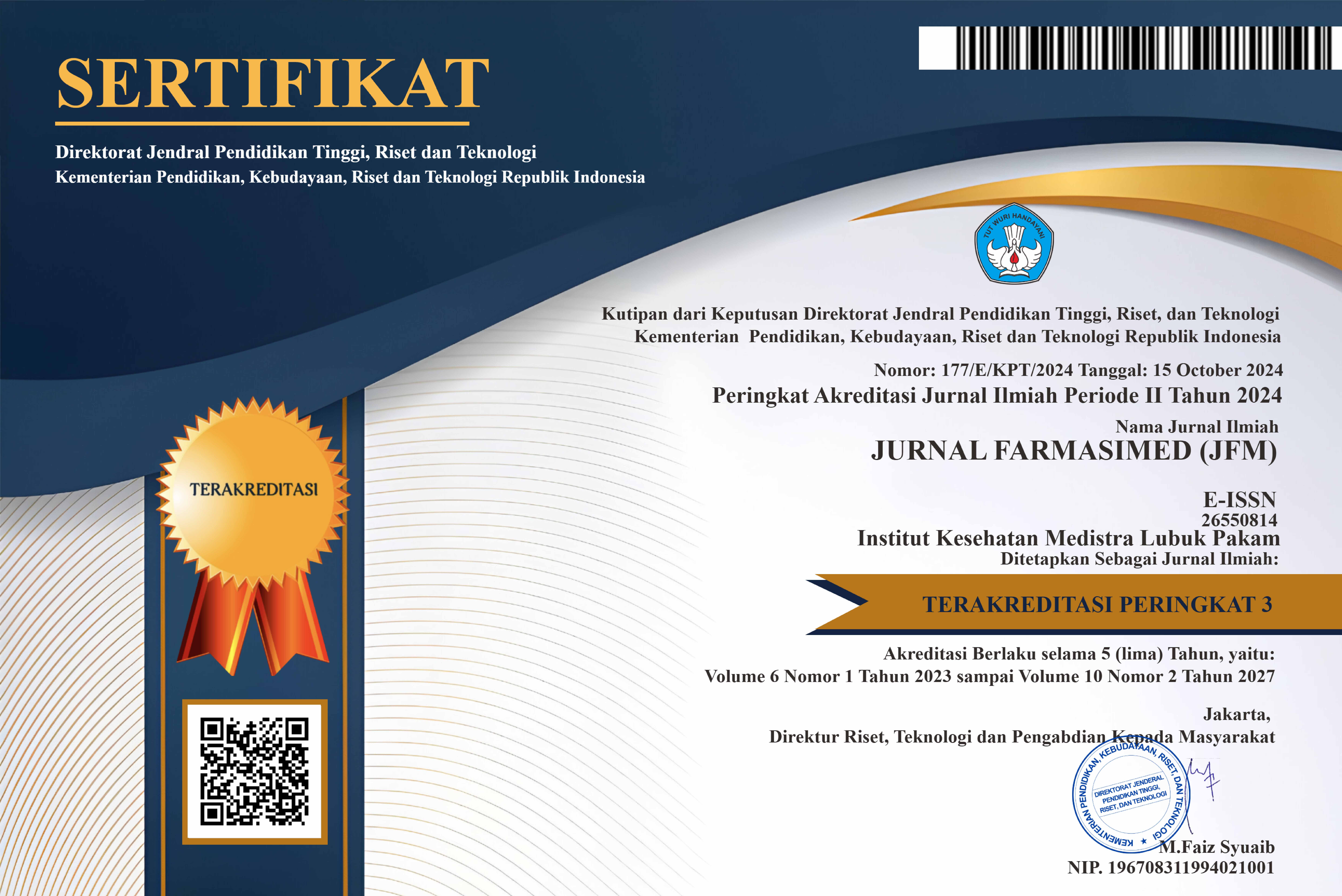THE EFFECT OF ETHANOL EXTRACT OF SOURSOP LEAVES (ANNONA MURICATA L.) ON BODY TEMPERATURE IN MALE MICE (MUS MUSCULUS) INFECTED WITH BACTERIA SALMONELLA TYPHI
DOI:
https://doi.org/10.35451/jfm.v6i1.1929Keywords:
Antibacterial, Salmonella typhi, typhoid fever, soursop leaves (Annona muricata L.)Abstract
Soursop leaves (Annona muricata L.) are a plant that has many health benefits that can be obtained from the fruit, leaves, and seeds. Soursop leaves contain saponins, flavonoids, tannins, and alkaloids which can act as an antiseptic-disinfectant or as an antibacterial. Flavonoid compounds can be used as wound medicine, antifungal, antimicrobial, anticancer, and antiviral. In society, it is used by boiling the leaves and then drinking the boiled water. This research aims to determine the effectiveness of soursop leaf ethanol extract as an antibacterial against Salmonella typhi so that fever can be reduced. The dosage includes 100; 150; 200; and 250 mg/kg BW. No treatment was given as a negative control and chloramphenicol tablets as a positive control. Based on data analysis, it shows that there is a significant difference in body temperature after being tested using the t-test with a value of 0.000 < 0.05. These results prove that body temperature which was initially normal during the acclimatization stage experienced an increase in body temperature when infected with Salmonella typhi. The results of the One-Way ANOVA test also showed an effect on reducing body temperature infected with Salmonella typhi. From several doses, the EDDS dose of 100 mg/kg BW was able to reduce body temperature by an average of 36.5°C.
Downloads
References
Gawa, A., Une, S., & Maspeke, P. N. (2020). Uji Aktivitas Antimikroba Ekstrak Daun Sirsak Terhadap Sifat Mikrobiologi Telur Asin. Jambura Journal of Food Technology, 2(2), 13-22.
Kandou, L.A., Fatimawali., dan Widdhi, B., (2016), Uji Aktivitas Antibakteri Ekstrak Etanol Rimpang Lengkuas Merah (Alphina purpurata (Vieill) k. Schum) terhadap Bakteri Klebsiella pneumoniae Isolat Sputum Penderita Bronkitis Secara In Vivo, J. Ilmiah Farmasi FARMACON, 5,3, 131-137
Nisa, A. K. (2019). Daya Hambat Ekstrak Daun Sirsak (Annona Muricata Linn) Terhadap Pertumbuhan Bakterisalmonella Typhi (Doctoral dissertation, Stikes Insan Cendekia Medika Jombang).
Novard, M. F. A., Suharti, N., & Rasyid, R. (2019). Gambaran bakteri penyebab infeksi pada anak berdasarkan jenis spesimen dan pola resistensinya di laboratorium RSUP Dr. M. Djamil Padang tahun 2014-2016. Jurnal Kesehatan Andalas, 8(2S), 26-32.
Paul, U. K. (2017). Typhoid Fever-Recent Management. API-Medicine Updat, 64-7
PN, P., & Hendrayana, M. A. (2020).Efek Ekstrak Metanol Daun Sirsak (Annona muricata) Dalam Menghambat Pertumbuhan Bakteri Salmonella typhi Secara In Vitro.
Putri, N. M., Arisanty, D., & Hilbertina, N. (2022). Potensi Ekstrak Daun Sirsak Dalam Menginduksi Apoptosis Sel Kanker Serviks HeLa. Jurnal Ilmu Kesehatan Indonesia, 3(1), 16-21.
Risa MI, Ismawati I, Budiman B, Sofia H, Garna H.(2019). Pengaruh Kebiasaan Buang Air Besar (BAB) terhadap Kejadian Demam Tifoid di RSUD Al-Ihsan Bandung Periode Maret–Mei Tahun 2018. J Integr Kesehat Sains.1(1):16–20.
Utami P. (2013). Umbi Ajaib Tumpas Penyakit. Jakarta: Penebar swadaya
Warbung, Y. Y. (2013). Daya hambat ekstrak spons laut Callyspongia sp terhadap pertumbuhan bakteri Staphylococcus aureus. E-GiGi, 1(2).
Zaid, Z., Indrianto, A. P., & Adityaningrat HF.(2021).We Need Protection: Reviewing Corporate Responsibilities And Strategies In Protecting Employees During The Pandemic. Journal Health & Science: Gorontalo Journal Health And Science Community, 5(2), 278-287.
Downloads
Published
Issue
Section
License
Copyright (c) 2023 Aminah Syarifuddin, Cucu Arum Dwi Cahya, Amelya Chyntia Br Sihombing

This work is licensed under a Creative Commons Attribution 4.0 International License.
Copyright in each article is the property of the Author.

























